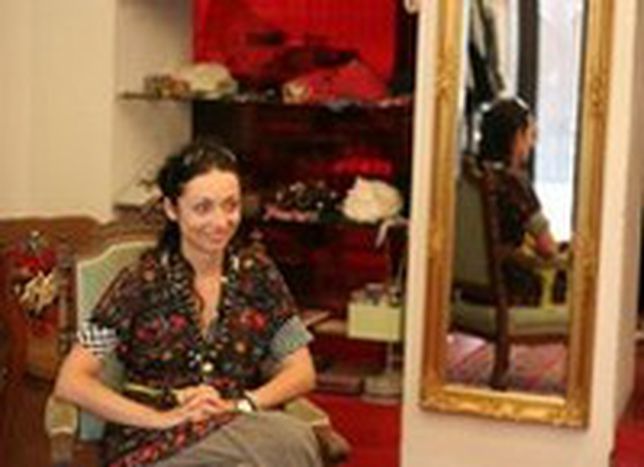
Baltic style
Published on
Translation by:
 anne-charlotte oriol
anne-charlotte oriol
33 year-old Daiva Urbonaviciüté is a stylist in Vilnius. Her original brand, both stylish and comfortable, seems all set to infect the West.
In a pedestrianised Stikliu street, near Vilnius’ city council, a shop called ‘Zoraza’ catches the eye. The place is tiny - it’s just a few square meters big. Leather jackets, furs, lace dresses, multi-coloured boots, cotton dresses, florid skirts, custom-made t-shirts, a high mirror and two ancient armchairs are arranged in a happy mess. In this small showroom-like place, Daiva Urbonaviciüté displays her creations.
It’s a workshop – boutique which looks like a boudoir. Further back, a small practical space overflows with fabric remnants, fashion magazines and tatters of sketches. A computer clutters up the drawing table, where the last fashion show pictures have been scattered.
Daïva seems to be proud of her small shop, in the middle of a district where the cream of society mill around. It’s been a long time since the Beaux-Arts Academy student spent five months on her sewing machine, designing her first collection. She invested all her money in producing a small show to commemorate it.
Today, Daiva Urbonaviciüté enjoys the status of respected designer. She is appreciated by jet-setters and businessmen alike. She created her own brand, ‘Zoraza’, and hires an executive manager to supervise the sales of her precious creations.
Vilnius is a small town; it didn’t take long for Zoraza to gain a good reputation. Fashion is the all-consuming, contagious passion of this shy young lady. Besides, Zoraza comes from the Russian slang word for ‘infection’. For the designer, ‘fashion should infect everybody.’ Her creation simultaneously detonates and surprises.
She asks the workers upstairs to forget the skills that they have previously learnt and instead take on her mentality and style, namely ‘not to sew rightly and perfectly, but rather in an unstable and curved direction, so that the cloth has a lively and smooth character.’
Breathing fashion
Like a virus, Zoraza’s style is slowly spreading. Ignoring all international trends, Daïva Urbonaviciüté creates clothes according to her feelings and whims, and not according to the current fashion. Getting inspiration from theatre costumes, her imagination and old comic drawings amongst others, she draws and invents as if she is not aware of it. Her two principles: comfort and style.
What matters for this unclassifiable young designer is to be at ease before being stylish, That’s why she only wears her own creations. She’s no snob - she says she just wants to feel good.
Daïva Urbonaviciüté makes fashion without being fashionable and that’s what is appealing. Neither classical nor contemporary, she has remained an outsider since the beginning in the late 1990s. Besides, she confidently advises her clients right from the start : ‘Feel good about yourself because, with my clothes, everyone will stare at you in the street.’
She is humble about her success and aware of her potential. She recalls remarks from some foreigners, who asked her when she first started out in her shop if her creations came from London, Paris or Milan. The proud reply was ‘No – they are originals from Vilnius!’
Londonian success?
Although it wasn’t easy, this young, smiling and gifted woman doesn’t hold any bad memories of the hard times she went through. ‘At first it was hard for me. I had never created in order to sell. I was creating, being artistic and shows above all were sublime artistic performances for me.’ Today, Daïva lives well. She dreams of working with Comme des Garcons, Christian Lacroix, Vivienne Westwood or else, opening a shop in London or Tokyo.
Her eyes sparkle when she remembers the story of one of her friends, a singer, who is living in London. She regularly phones Daïva and begs her to come and set up a store in London because, ‘she can’t go out in the streets with the jacket I created without being stopped by everybody and getting asked where she got it.’ For the moment, Daïva is staying put in Vilnius. ‘I might earn more money elsewhere, but here people like what I’m doing. Plus I don’t know how my work would be welcomed. To me, the most important thing is to get a response to my creations.’
As soon as she talks about dressmaking, Daïva Urbonaviciüté’s face overflows with a wide smile. She just simply loves her job, and talking about it. In a humble way, she admits that she doesn’t always recognize her clothes once they are worn. ‘Often, when the dressmakers bring me clothes from the sketches I gave them a couple of weeks ago, i don’t recognise them. It’s sometimes so beautiful and so astonishing that I don’t understand how i could have such an idea.’
Translated from Style baltique


